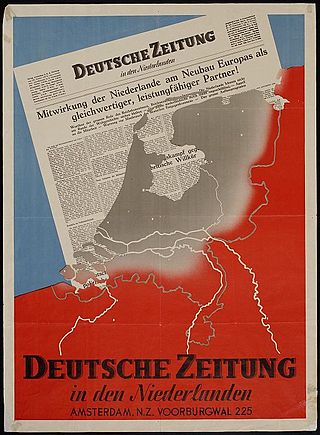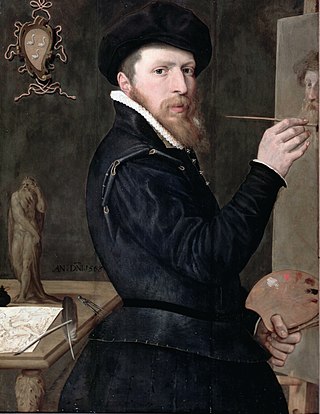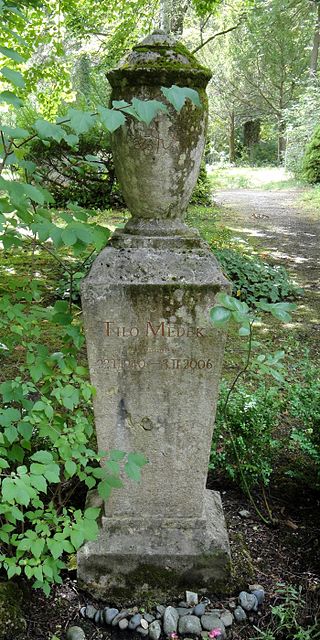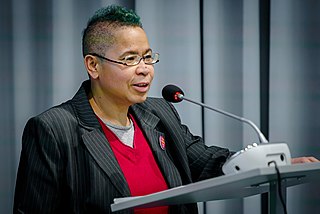Johan Willem Friso Wielenga (born 1956) [1] is a Dutch contemporary historian.
Johan Willem Friso Wielenga (born 1956) [1] is a Dutch contemporary historian.
Born in Rotterdam, Wielenga studied history and politics at the Vrije Universiteit Amsterdam from 1975 to 1978 and in 1982/1983 with a German Academic Exchange Service scholarship at the Rheinische Friedrich-Wilhelms-Universität Bonn. He received his Doctorate in 1989. He then taught International relations at the University of Groningen and from 1990 Political history at the Utrecht University. In 1992, he became associate professor of German Contemporary history and Dutch-German relations at the University of Groningen and in 1997 associate professor of German contemporary history at the University of Utrecht.
Wielenga has been director of the Haus der Niederlande at the Westfälische Wilhelms-Universität between 1999 and 2021. He works as a journalist for the Dutch daily newspapers de Volkskrant and NRC Handelsblad .
In 2015, he was awarded the Bundesverdienstkreuz am Bande for his services to German-Dutch relations. [2]

In historical and comparative linguistics, Low Franconian, Low Frankish or Netherlandic is a linguistic category used to classify a number of historical and contemporary West Germanic varieties closely related to, and including, the Dutch language. Most dialects and languages included within this category are spoken in the Netherlands, northern Belgium (Flanders), in the Nord department of France, in western Germany, as well as in Suriname, South Africa and Namibia.
BRD is an unofficial abbreviation for the Federal Republic of Germany, informally known in English as West Germany until 1990, and just Germany since reunification. It was occasionally used in the Federal Republic itself during the early Cold War; it was commonly used between 1968 and 1990 by the ruling party of the German Democratic Republic, resulting in a strong deprecation of its use in West Germany. The East German regime had previously used the term "German Federal Republic", which it abbreviated as "DBR", to refer to West Germany. The most widely used abbreviation for West Germany in the country itself was its ISO 3166-1 alpha-2 country code "DE", which has remained the country code of reunified Germany.

The Dollart or Dollard is a bay in the Wadden Sea between the northern Netherlands and Germany, on the west side of the estuary of the Ems river. Most of it dries at low tide. Many water birds feed there.
Dutch dialects are primarily the dialects that are both cognate with the Dutch language and spoken in the same language area as the Dutch standard language. They are remarkably diverse and are found within Europe mainly in the Netherlands and northern Belgium.

South Guelderish refers to the easternmost group of Low Franconian dialects spoken along the lower Rhine. In its narrower sense, the term refers strictly to the Rivierenlands, Nijmeegs, and Liemers sub-dialects; in its broader sense, the term encompasses also North Limburgish in the Netherlands and Kleverlandish in Germany. South Guelderish — especially Rivierenlands — is sometimes included as part of Brabantic, a more widely spoken Dutch dialect and the closest relative of South Guelderish. Alternatively, it is considered to extend southward into Northern Limburg until the Uerdingen line.

The Deutsche Zeitung in den Niederlanden was a German-language nationwide newspaper based in Amsterdam, which was published during almost the entire occupation of the Netherlands in World War II from June 5, 1940 to May 5, 1945, the day of the German capitulation in the "Fortress Holland". Its objective was to influence the public opinion in the Netherlands, especially the one of the Germans in this country.

Lake Senftenberg is an artificial lake in Landkreis Oberspreewald-Lausitz, Brandenburg, Germany. It is located in the Lusatian Lake District, a chain of artificial lakes. The lake is located on the border of Lower and Upper Lusatia between the southern Brandenburg city of Senftenberg and its districts Niemtsch and Großkoschen. Lake Senftenberg is one of the largest artificial lakes in Germany with an area of 1300 hectares.

Isaak Nicolai or Isaac Claesz van Swanenburg was a Dutch Renaissance painter and glazier active in Leiden and Gouda. He was a city council member from 1576 and became mayor of Leiden five times.
The subdivision of West Central German into a series of dialects, according to the differing extent of the High German consonant shift, is particularly pronounced. It known as the Rhenish fan because on the map of dialect boundaries, the lines form a fan shape. Here, no fewer than eight isoglosses, named after places on the Rhine River, run roughly west to east. They partially merge into a simpler system of boundaries in East Central German. The table below lists the isoglosses and the main resulting dialects, arranged from north to south.

Helmut Müller-Enbergs is a German political scientist who has written extensively on the Stasi and related aspects of the German Democratic Republic's history.

Tilo Medek, originally Müller-Medek, was a German classical composer, musicologist and music publisher. He grew up in East Germany, but was inspired by the Darmstädter Ferienkurse. He composed radio plays and incidental music. His setting of Lenin's Decree on Peace led to restrictions, and after he showed solidarity with the expatriated Wolf Biermann, he also had to move to the West, where he composed an opera Katharina Blum based on Heinrich Böll's novel, and worked in education. He received international awards from 1967 onwards.
Ellen Widder is a German historian.
Gregor Herzfeld is a German musicologist.
Walther Hermann Vetter was a German musicologist. From 1946 to 1958, he was professor at the Humboldt University of Berlin.
Renate Brockpähler was a German folklorist.

Peggy Piesche is a German literary and cultural scientist, works in adult education and works as a consultant for diversity, intersectionality and decoloniality in the Bundeszentrale für politische Bildung. Peggy Piesche is one of the most famous voices of Black women in Germany. Her identities also include lesbian.

Horst Lademacher is a German historian specializing in the history of the Netherlands. He was a professor of modern history at the Vrije Universiteit Amsterdam, University of Kassel and the University of Münster. At the latter institute he was also director of the Zentrum für Niederlande-Studien from 1990 to 2000.

Eberhard Rebling was a German pianist, musicologist and dance scholar as well as an anti fascist.
Jan Willem Loot was a Dutch orchestra administrator.

Inner German relations, also known as the FRG-GDR relations, East Germany-West Germanyrelations or German-German relations, were the political, diplomatic, economic, cultural and personal contacts between the two countries; Federal Republic of Germany and German Democratic Republic, at the period of the official West-East division in German history from the founding of East Germany on 7 October 1949 to Germany's reunification on 3 October 1990.